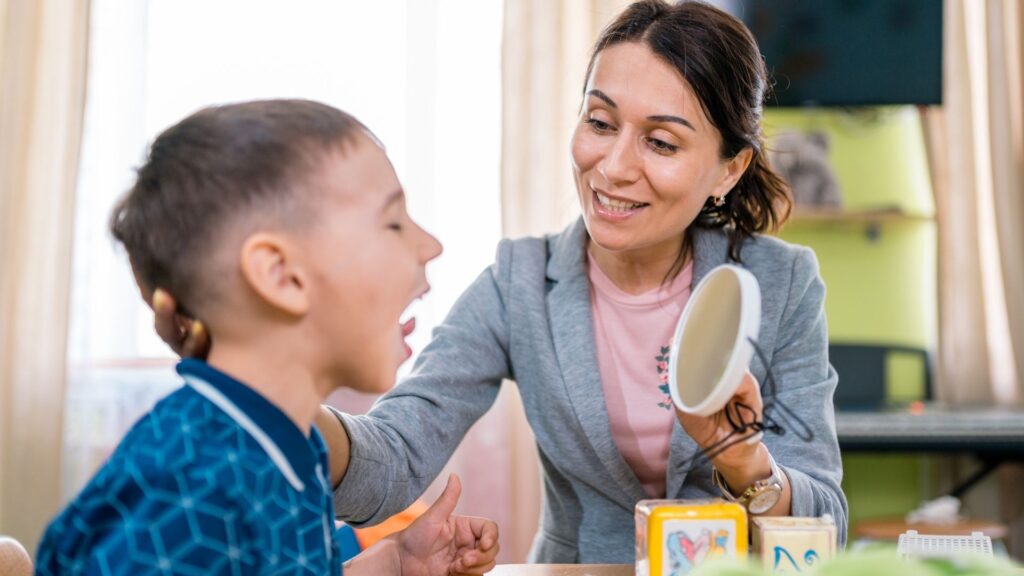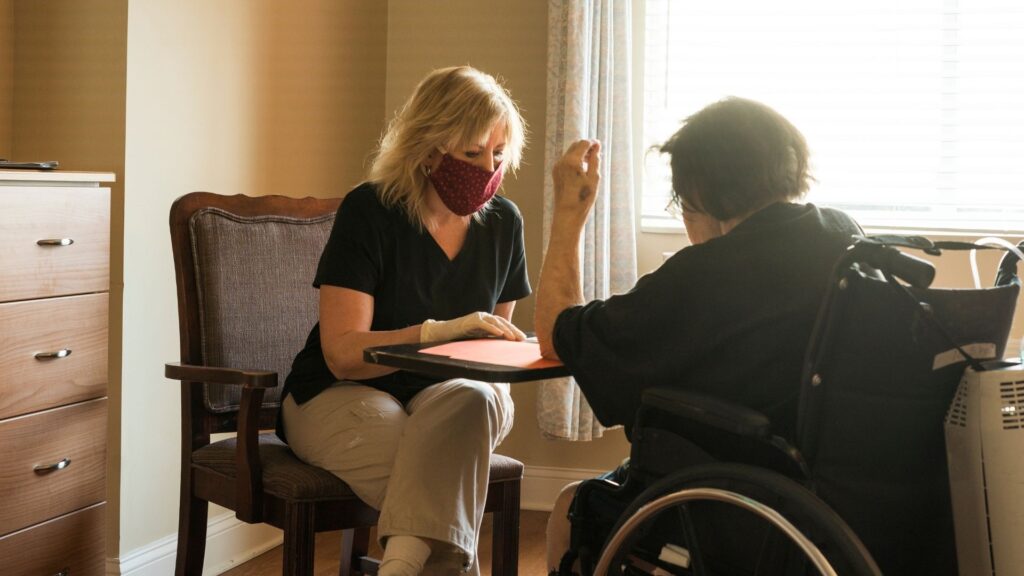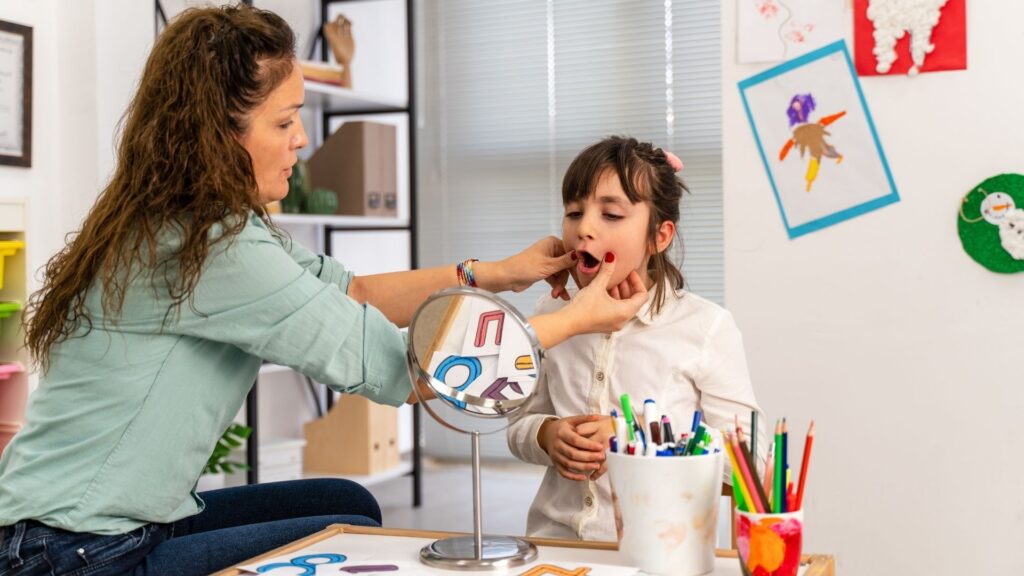
Unlock the Power of Speech
Speech is the use of vocal sounds to express thoughts. A speech disorder is a condition that makes it difficult for a person to communicate through spoken words. They are also known as communication disorders.
Early onset speech difficulties affect some people. Accidents, strokes, and brain injuries can cause speech disorders in otherwise healthy adults. After experiencing trauma, it may be tough to express oneself and may have trouble forming words properly. Communication abilities can be honed through speech therapy following a traumatic experience. Normal speech can be regained with time.
Communication difficulties and speech abnormalities are evaluated and treated in speech therapy. Professionals known as speech therapists or speech-language pathologists (SLPs) carry the therapies out. Depending on the nature of the speech or language impairment being treated, speech therapists may employ a variety of approaches, such as articulation therapy and language intervention exercises.
In this article, speech therapists affiliated with Sirwiss describe what speech therapy comprises, the conditions it may help, and how it works. If you’re interested in learning more about speech therapy, you’ve come to the perfect place.
What is Speech Therapy?

Speech disorders can develop in multiple ways.
They can occur due to:
- Nerve injuries to the brain
- Muscular paralysis
- Structural abnormalities
- Developmental disabilities
Studies show that 8% of children and teens (ages 3 to 17) may have a communication problem. Speech therapy is a good way to treat problems with communication and speech, and speech therapists are well-known experts in their area. These are the people in the medical field who focus on figuring out why people have trouble speaking and eating and helping them get better.
What is a Speech Therapist?
Speech therapists assist persons who have difficulty speaking. They also assist people who have difficulty eating and drinking apart from the communication barrier. These therapists work with patients of all ages. They assist youngsters with developing their speech at an early age if they are slow to begin speaking. They assist adults who have been in an accident and have lost their capacity to talk properly.
Speech therapists also assist elderly who are experiencing trouble eating or swallowing. People who have had a stroke lose some of their speech because a portion of their brain no longer functions. Slurred, raspy, and strained speech develops. Speech therapists assist individuals in regaining control of their communication through frequent physiotherapy sessions, which teach them how to develop muscular strength and restore control of their speech.
Speech Therapy for Children

A child may get speech therapy in a classroom setting as part of a small group or one-on-one. This is determined by the type of speech impairment they are suffering. To assist patients in overcoming their individual challenges, the SLP will use therapeutic exercises and activities. These include:
- Language activities: Involves playing and talking with the child while using pictures, books, and objects to stimulate language development. The SLP may also demonstrate correct pronunciation and use repetition exercises to help increase the child’s language skills.
- Articulation activities: These will involve the SLP working closely with a child to help them with their pronunciation. The SLP will demonstrate how to make specific sounds, often during play activities.
- Feeding and swallowing therapy: An SLP can work closely with a child with chewing or swallowing issues. The SLP can also use oral exercises to help strengthen the muscles in the mouth or work with different food textures to improve the child’s oral awareness.
- Exercises: The SLP may use a number of tongue, lip, and jaw exercises, alongside facial massage to help strengthen the muscles around the mouth. This can help them with future speech and communication.
Both tactics and assignments will be given to the child by the SLP. These drills provide them with the opportunity to practice with a parent or caregiver in the comfort of their own home.
Speech Therapy for Adults

An SLP can use several different techniques as part of adult speech therapy. These include:
- Social communication: The SLP may use problem-solving, memory activities, and conversation exercises to improve communication.
- Breathing exercises: An SLP may use breathing exercises to assist with resonance issues.
- Mouth exercises: These are a suitable way to strengthen oral muscles, which can help improve communication.
- Swallowing exercises: Medical issues, such as Parkinson’s disease, oral cancer, or a stroke, may cause swallowing difficulties. An SLP can use swallowing exercises to help a person manage these issues.
How Long Do You Need Speech Therapy?
The amount of time a person needs speech therapy depends on a few factors, including:
- Their age
- Type and severity of the speech disorder
- Frequency of therapy
- Underlying medical condition
- Treatment of an underlying medical condition
While certain forms of childhood speech impairment do get better with time, others persist into adulthood and require ongoing treatment and support. Treatment and recovery from a stroke or other medical condition can help restore communication skills that were impaired.
Conditions Treated Through Speech Therapy
An SLP can use speech therapy to treat several conditions, which include the following:
Stuttering
Experts define stuttering as a speech condition in which the affected person repeatedly uses the same syllables, words, or sounds. Stuttering is characterized by the repetition or elongation of words, syllables, or sentences. A person who stutters can understand what they want to say, but they struggle to convey it in a clear, fluent way. A stutter may also be called a stammer.
Aphasia
Aphasia is a language and speech condition that causes severe impairment. Aphasia can be brought on by damage to language-processing areas of the brain. The majority of cases in adults are brought on by strokes. A person with aphasia may have trouble reading and writing, as well as problems communicating through speech. The National Institute on Deafness and Other Communication Disorders estimates that one million Americans have aphasia and that nearly 180,000 new cases are diagnosed annually.
Articulation disorders
Articulation disorder is defined by experts as a speech and language issue that stands alone. People with articulation difficulties have difficulty coordinating their vocal tract, lips, tongue, teeth, palate, and breathing to produce speech sounds. People with these conditions may substitute different sounds for the ones they want, such as saying “wabbit” for “rabbit.” These sounds may be produced correctly by a person with phonological difficulties, but they may be used incorrectly within a word. Words are frequently mispronounced by those with articulation difficulties. Many people also struggle with other aspects of their language growth.
Specific language impairment
A specific language impairment (SLI) is a disease that prevents kids from developing typically. There is no documented neurological, sensory, or intellectual impairment that causes this illness. A child’s ability to speak, listen, read, and write can all be impacted by SLIs. Developmental dysphasia, developmental language disorder, and language delay are all terms used by specialists. SLI is one of the most prevalent developmental disorders, affecting between 7 and 8 percent of kindergarteners. Even in maturity, the disease can have an effect. An individual’s quality of life in their personal, social, and professional spheres can all benefit from speech therapy.
Resonance disorders
A resonance issue can be triggered if the normal passage of air through the mouth while speaking is interrupted. These conditions cause speech to become garbled because they disrupt the vibrations necessary for communication. This speech problem is frequently linked by medical professionals to neurological conditions like cleft palates.
What are Speech Therapy Techniques?

The speech therapy techniques vary depending on the condition. Some techniques are noted below:
Articulation Therapy – This technique may include helping a person make certain sounds and noises, which will eventually help them speak properly.
Oral Motor Therapy – This type of therapy is used to strengthen the muscles in the mouth through massaging and other techniques. It is used on people who have had an injury which caused them to lose the ability to speak.
Language Intervention Therapy – This is mainly used on children who are going through delays in starting to speak. This technique helps them to start talking.
VitalStim Therapy – This really helps people who have difficulty in swallowing following an accident such as a stroke. It helps with regaining control eating, drinking, swallowing, and talking.
There are other techniques but the above are the main ones who tackle a variety of issues and help patients get back on track with their speech.
What Ages is Speech Therapy Suitable For?
All ages can take advantage of it equally. If a child is still not talking by the age of two, a speech therapist can help them get started. Accident victims, at any stage in their lives, may benefit from talking to a therapist. If an elderly person in a nursing home is having trouble eating or drinking, one of the methods described above may be able to help. Any time a person sustains a brain injury, it can have a negative impact on their ability to communicate through speech and sound.
Does This Type of Therapy Work?
This method of treatment is, without a doubt, quite efficient. Many parents have reported their children’s first words after only a few sessions. After working with a speech therapist on a consistent basis, people who suffered brain damage regained nearly all of their verbal abilities. What speech therapists offer us is something we couldn’t have without their help. After an accident, we often need the assistance of a speech therapist to regain our confidence in our ability to communicate. We couldn’t regain control of our voices so quickly without them. Although pricey, they are well worth the investment.
Despite the prevalence of speech and communication difficulties in the United States, research has shown that speech therapy is highly effective in treating these conditions. Both children and adults can benefit from speech therapy, and speech-language pathologists (SLPs) have a wide range of tools at their disposal for facilitating clients’ progress.